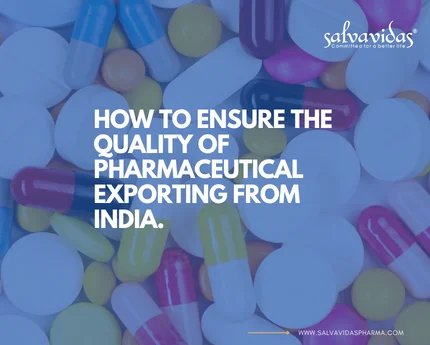
Introduction:
India is known for its pharmaceutical industry and is considered to be the largest producer of generic drugs in the world. Pharmaceuticals exported from India are in high demand globally due to their quality, affordability, and availability. However, to maintain this reputation, it’s crucial to ensure that the quality of these drugs meets the required standards. In this article, we will discuss the measures that need to be taken to ensure the quality of pharmaceuticals exported from India.
Regulations for Exporting Pharmaceuticals from India
To maintain the quality of pharmaceuticals exported from India, the government has set several regulations in place. These regulations ensure that the drugs produced in India meet international standards of quality, safety, and efficacy. Some of the key regulations include:
- The Drugs and Cosmetics Act of 1940
- The Drugs and Cosmetics Rules 1945
- The World Health Organization (WHO) GMP Guidelines
These regulations help in controlling the production, distribution, and sale of drugs in India. The drugs manufactured in India are also subject to regular inspections and audits to ensure that they meet the required standards.
Good Manufacturing Practices (GMP)
Good Manufacturing Practices (GMP) is a set of guidelines that ensure the quality of drugs produced in a manufacturing facility. These guidelines cover every aspect of drug production, from the raw materials used to the packaging of the final product.
In India, all pharmaceutical manufacturers must comply with the WHO GMP guidelines to ensure the quality of their products. The WHO GMP guidelines include requirements for the design, construction, and maintenance of the manufacturing facility, as well as the production processes and quality control procedures.
Quality Control Measures
Quality control measures are an essential part of ensuring the quality of pharmaceuticals exported from India. These measures ensure that the drugs produced are free from impurities, contaminants, and defects. Some of the key quality control measures include:
- Raw Material Testing: The raw materials used in drug products must be tested to ensure their quality and purity.
- In-Process Testing: During the production process, the drugs are tested to ensure that they meet the required standards.
- Final Product Testing: Before the drugs are packaged and exported, they are subject to final product testing to ensure their quality and efficacy.
These quality control measures help in ensuring that the drugs exported from India are of the highest quality and meet the required standards.
Role of Quality Assurance (QA)
Quality Assurance (QA) plays a crucial role in ensuring the quality of pharmaceuticals exported from India. The QA team is responsible for overseeing the production process and ensuring that all quality control measures are being followed. They also perform regular audits and inspections to ensure that the drugs produced meet the required standards.
The QA team is also responsible for developing and implementing procedures to ensure that any issues with the drugs are addressed promptly. This includes investigating any customer complaints, implementing corrective and preventive actions, and ensuring that the root cause of the issue is addressed.
Frequently Asked Questions
Q. Why is it important to ensure the quality of pharmaceuticals exported from India?
A. It is important to ensure the quality of pharmaceuticals exported from India because these drugs are consumed by people globally. Poor-quality drugs can cause serious health problems and have negative consequences for both the patients and the pharmaceutical industry.
Q. What are the regulations for exporting pharmaceuticals from India?
A. The regulations for exporting pharmaceuticals from India include The Drugs and Cosmetics Act 1940, The Drugs and Cosmetics Rules 1945, and the World Health Organization (WHO) GMP Guidelines. These regulations ensure that the drugs produced in India meet international standards of quality, safety, and efficacy.
Q. What are Good Manufacturing Practices (GMP)
A. Good Manufacturing Practices (GMP) is a set of guidelines that ensure the quality of drugs produced in a manufacturing facility. These guidelines cover every aspect of drug production, from the raw materials used to the packaging of the final product.
Q. What is the role of Quality Assurance (QA) in ensuring the quality of pharmaceuticals exported from India?
A. The role of Quality Assurance (QA) is to oversee the production process and ensure that all quality control measures are being followed. The QA team also performs regular audits and inspections to ensure that the drugs produced meet the required standards. They are responsible for developing and implementing procedures to address any issues with the drugs and ensure that the root cause is addressed.
Conclusion:
Exporting quality pharmaceuticals from India is essential to maintain its reputation as a leading producer of generic drugs. By following the regulations set by the government, implementing Good Manufacturing Practices (GMP), and implementing quality control measures, the quality of pharmaceuticals exported from India can be ensured. The role of Quality Assurance (QA) is crucial in ensuring that the drugs produced meet the required standards and any issues are addressed promptly. Ensuring the quality of pharmaceuticals exported from India is not just important for maintaining its reputation, but also for ensuring the health and well-being of the people who consume these drugs globally.
Contact Us:
Name: salvavidas pharmaceutical pvt. ltd
Email: info@salvavidaspharma.com
Phone No: +91 98983 21242
Address: Corp. Office #102, Shubh Square, Near Lal Darwaja, Surat, Gujarat 395004, India

0